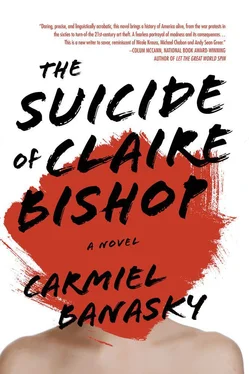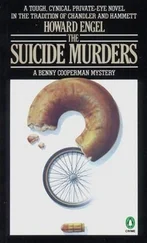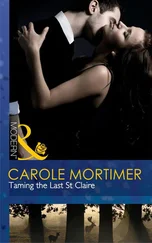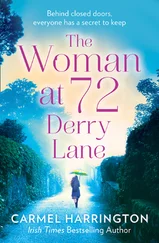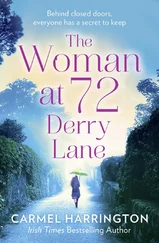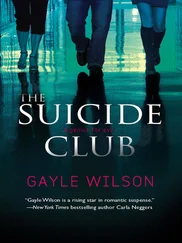“I do mean it.”
“Prove it.”
She braced the plush arms of her chair. “I slept with Tomasz.”
Freddie coughed. “Tomasz. The super?” His coughed and laughed at once. “That’s ridiculous. That is so ridiculous it’s embarrassing. I don’t even believe you.”
“That’s fine, don’t believe me,” Claire said.
“What’s gotten into you? Is this about yesterday on the river? It was a joke. You can’t honestly be mad about that.”
“You know that’s not it,” said Claire.
“What is it?” Then he laughed. “Is this about the painting? It is, isn’t it? Jesus, Claire.”
“It’s not about the painting. I had it destroyed anyway.”
“Destroyed? What do you mean?” When she didn’t answer, he stood with more gusto than she’d seen in him for days. “Let me know when you’re done feeling sorry for yourself and maybe we’ll have some fun again.” His nose was running and he wiped it with the back of his hand. “What do you plan to do for money? Where will you go?”
Claire put down her book and looked him in the eye. “I’ll live here. You’ll move out.”
“Is that so?”
Claire held her stare.
Freddie stumbled toward her and pulled her from the armchair and held her forearms tight, as if he planned to shake her. She didn’t fight him. “It’s just a painting, Claire.”
“I know it’s just a painting!”
Freddie let go of her and stood with his arms at his sides like they were someone else’s arms. Claire knew that if she walked into those arms, they would embrace her and all of this would go away, and the painting might be a painting.
She flew from the room, down the hall to the den, and lunged for the glass display cabinet. She grabbed as many plates and porcelain clowns as she could hold against her chest with one hand. With the other she grabbed the wooden case that held her fork collection and wobbled to the window. Freddie was behind her, catching his breath. The window would not magically open, and she tried to tuck the case under her arm to manage a free hand. Only then did Freddie snap to and say her name.
It was exactly the way her mother said her name when Claire first returned home after marrying Freddie: Claire had changed, and her mother was betrayed by that.
Freddie reached around and opened the window for her.
“Do it,” he said, smiling.
She turned to him, at once horrified and furious. Then she chucked every last trinket out the window. She would have liked to have laughed. Giddy desire. A string of deadly, smashing clowns.
Claire stood in the hall, wool coat in hand, facing the front door. If she could stand still forever, nothing would happen to her, nothing bad, and the painting would not mean a thing. It struck Claire that she could have lied to Nicolette — she could have told someone else’s story, and would the portrait have changed? Would it show a different fate? Or wish?
She could hear Freddie packing, huffing and shoving his illness into a few tired suitcases. She imagined his mean laugh and the whole circus of Greenwich Village calling her a fool for thinking she could survive alone. Panic began to swell in her stomach, her chest. She tried to tamp it down with the simple task of slipping her arms through her coat sleeves. She felt sorry for Freddie. It was a thrill, a rush of heat to say, even as she only half-believed it, “What do I care what you all think?” This was her town, her circus. In the back of her mind was a faint singing, the choir of anticipation — that cocktail of dread and hope all flattened into one note.
She opened the door.
PART II: THE FUTURE IS FIXED, THE PAST AMBIGUOUS 2004
And that’s why I’m telling you all this truth stuff, Dear Listeners, partly because I have no clue what you do or do not already know. Maybe you know everything I do. Maybe you’ve been with me since I was born a squirming baby boy, or, who knows — before. But I’m not interested in objective Truth with a capital T. I’m talking about truth, subjective and hairy. And here it starts, because today I’m going to see Nicolette.
Truth: My name is West Butler and I am not like most people. I’ve worked as a data miner and network engineer in New York City for the last ten years, ever since I left my home of Port Townsend, Washington (a little Victorian thing on the Olympic Peninsula), and I am in love with an artist.
But that is not the whole of why I’m not like other people.
The last time I saw Nicolette, nearly a year ago, she said it would be dangerous for me if I tried to find her. But that doesn’t stop me from getting on the 1 train to the Bronx. I have the whole orange plastic row to myself until a woman sits down beside me. At first I want to pull her hair, but I’m not willing to give up my seat. And I don’t mind it after a minute, being that close to someone, sharing space and time. She sees me looking at her but I don’t look away. I’m trying to remember her face because there’s something odd about it — she has large pores, a map on her skin. There’s a message I want to memorize, there’s a clue to find. But her face doesn’t stick. If I look away, she’ll disappear.
I tracked down Nicolette’s new number from a gallery that used to represent her, and we made plans via text message (though she’s not very good at it yet) to meet in public at her current installation — what bloggers call the “landmine house.” She said she had to go there anyway to fix something that got knocked down in the wind, and we could grab coffee and talk after — because I’m healthier now, and we’re both ready to see each other again.
Do you remember how, when she left, my heart crawled across the floor like a crab? At least I could find it again if I needed it, follow those tracks behind the bookshelf.
Something is about to change. And not the way something is always about to change. I feel it in my toes, which have turned to ice chips. The melting and melding of seats and bodies in the humid underground.
I feel like I’m about to meet Nicolette for the first time again. This is her first installation in over a year. She painted dozens of portraits of me back when we were together, but I haven’t seen them since she took them with her when she left, back when I was in the hospital.
I don’t blame her for that.
What if she doesn’t show? What if the landmine house isn’t even up anymore and I can’t find her? I waited too long to reach her. Not that I haven’t tried before.
I dig out my little pad and pen. The woman next to me tries to look over my shoulder to see what I’m writing, so I write messier than usual.
All thoughts are potential clues. Pebbles dropped along a path of pebbles leading back to my true self fixed high above me. I must document these clues or they will be lost, forgotten, unwritten from time. My love will never have existed.
In this particular subway car, two clues shine out: 1) the woman’s map of a face and 2) the graffiti. Riding the 1 train feels like stepping into a child’s drawing: the windows are covered in scratch graffiti and the floors in loopy black, and every advertisement has at least one moustache penned across a model’s lip. And, like a child’s drawing, the train doesn’t quite make sense: who’s that guy in the seat across from me with the top hat, and why does he have no shoes? I wish I were a graffiti artist, here but not here, shouting out my unknowability. I am unlocatable! Just try to find me.
Not unlike Nicolette, who so easily slips away.
But what if it’s awkward, because we’re not supposed to see each other and everyone knows that? What if I see the installation and don’t get it and can’t fake it?
All fears are clues. I write them down. Like Buckminster Fuller, who archived his life, organizing every slip of paper, every bill, every letter, every idea into clues and proofs as evidence for his existence. Forty-five tons of material. He couldn’t judge what was valid, so he included everything, what he ate then what he shat. He didn’t know MySpace was coming. He wasn’t trying to write a book. He was trying to tell the Grand Story, and not for us — for people or aliens to dig up a hundred years from now, to see how much changed in one lifetime, how the world could go from genocide to civil rights to genocide. How one person could change everything. Or not.
Читать дальше
